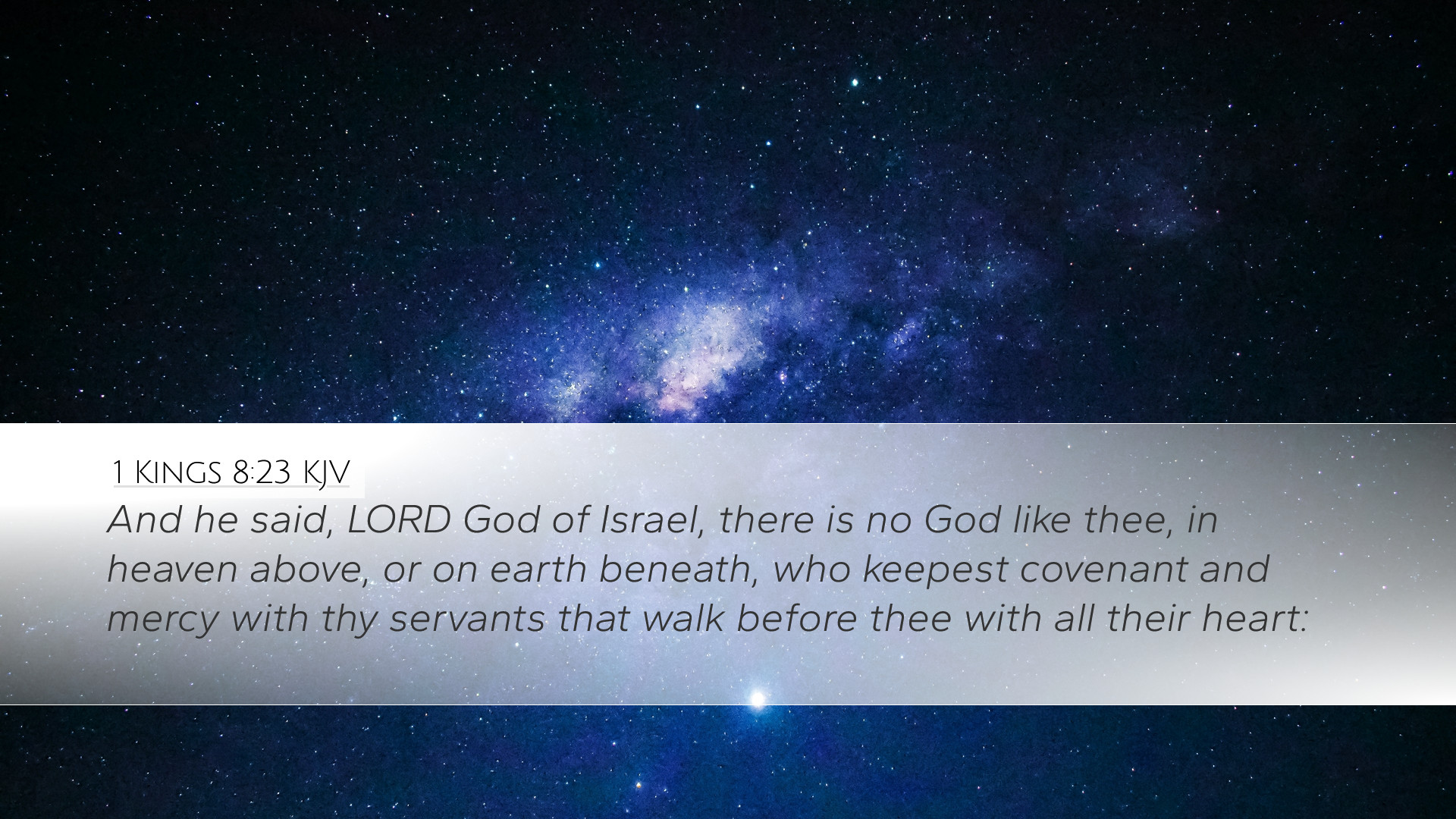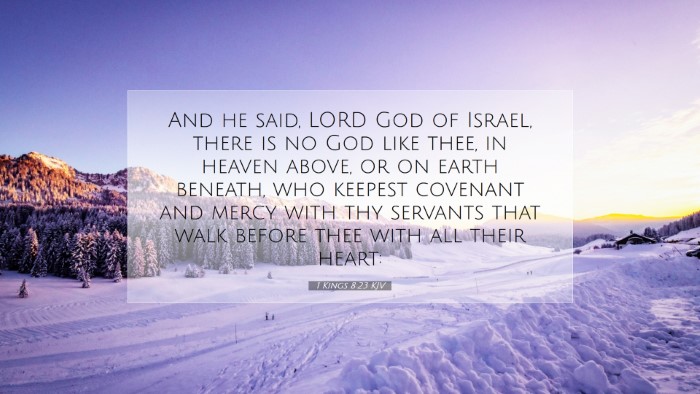Commentary on 1 Kings 8:23
Verse Text: "And he said, Lord God of Israel, there is no God like thee, in heaven above, or on earth beneath, who keepest covenant and mercy with thy servants that walk before thee with all their heart."
Introduction
The verse represents a momentous declaration made by Solomon during the dedication of the Temple, reflecting his understanding of God's nature and character. It serves as an important theological foundation for the themes of covenant, mercy, and the divine relationship with humanity.
The Character of God
Solomon’s declaration highlights the uniqueness of God. Public domain commentaries emphasize several key characteristics:
- Uniqueness: Solomon begins by affirming that there is "no God like thee," signifying God's unrivaled position as the Creator. Matthew Henry points out that this assertion sets the stage for understanding Israel's God as distinct and supreme over all others.
- Transcendence and Immanence: "In heaven above, or on earth beneath" demonstrates God's majesty over all creation. Albert Barnes notes that while God is sovereign in the heavens, He is also intimately involved in the affairs on earth.
- Faithfulness to Covenant: The phrase "who keepest covenant" illustrates God's unchanging faithfulness. Adam Clarke illustrates that the covenant God made with Abraham and his descendants is central to Israel's identity and blessings.
The Nature of Covenant
The concept of covenant is pivotal in this verse and throughout the Old Testament. Each commentator expands on its implications:
- Divine Commitment: God is portrayed as a keeper of promises, which reassures His people of their security in His faithfulness. Matthew Henry articulates that the covenant includes both promises of blessings and requirements for obedience.
- Conditionality: The covenant is not merely an unconditional promise; it requires active participation and a heart devoted to God. Albert Barnes emphasizes that walking in faithfulness is crucial to experiencing God's mercies.
- Historical Context: Adam Clarke contextualizes this verse within Israel’s history, noting that Solomon's prayer reflects centuries of God's unwavering fidelity despite Israel’s failures.
The Role of Mercy
Solomon’s mention of "mercy" is significant and reflects the theological concept of grace:
- God’s Compassion: The term implies a deep emotional response from God towards His people. Matthew Henry suggests that God’s mercy is a manifestation of His love and compassion, persisting through Israel's disobedience.
- Inclusiveness: God's mercy is available to those who sincerely follow Him. Albert Barnes highlights that it's extended towards “thy servants” indicating a relationship marked by obedience and reverence.
- Longsuffering Nature: Adam Clarke reflects on God's patience in waiting for His people to return to Him, a theme prevalent throughout scripture.
The Heart of Worship
Central to Solomon’s prayer is the call for a heart that "walks before thee with all their heart." This phrase encapsulates the essence of true worship:
- Sincerity in Worship: Worship is portrayed as a heartfelt commitment to God. Matthew Henry comments on the importance of genuine relationship over mere ritual.
- Holistic Devotion: Albert Barnes emphasizes that “all their heart” signifies total commitment; a divided heart cannot fully experience God's blessings.
- Transformative Relationship: Adam Clarke notes that such a relationship leads to transformation, encapsulating the idea that a faithful life produces visible fruit.
Theological Implications
This verse holds significant theological implications for the reader's understanding of God’s character:
- The Nature of God: Understanding that God is unmatchable shifts our perception of worship from obligation to honor.
- God’s Faithfulness: The faithfulness of God as a covenant keeper reassures believers of His never-failing love.
- Call for Response: A reminder that true worship involves living faithfully according to God’s statutes.
Conclusion
In summary, 1 Kings 8:23 encapsulates profound truths about God’s unique nature, His covenant faithfulness, and the call for sincere worship. This verse serves as a reminder to believers to engage with God wholeheartedly, trusting in His mercies that are new every morning. Solomon's prayer establishes a model for both individual and corporate worship as it invites God's presence into the hearts of His people.


